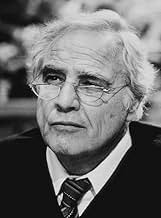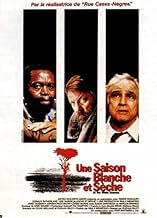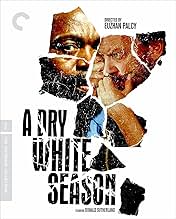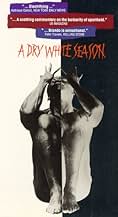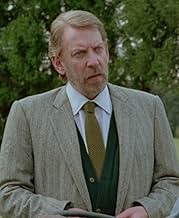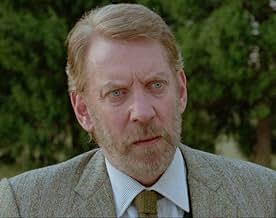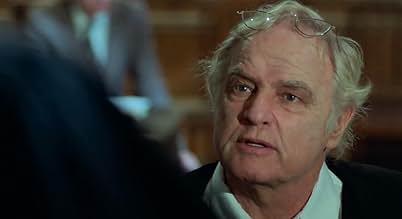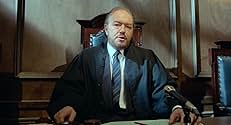Un suburbano bianco della classe media sudafricana accetta di aiutare il suo giardiniere nero a trovare suo figlio imprigionato. La sua indagine gli apre gli occhi sugli orrori commessi dall... Leggi tuttoUn suburbano bianco della classe media sudafricana accetta di aiutare il suo giardiniere nero a trovare suo figlio imprigionato. La sua indagine gli apre gli occhi sugli orrori commessi dalla polizia segreta e lo trasforma in un bersaglio.Un suburbano bianco della classe media sudafricana accetta di aiutare il suo giardiniere nero a trovare suo figlio imprigionato. La sua indagine gli apre gli occhi sugli orrori commessi dalla polizia segreta e lo trasforma in un bersaglio.
- Regia
- Sceneggiatura
- Star
- Candidato a 1 Oscar
- 2 vittorie e 9 candidature totali
- Captain Stolz
- (as Jurgen Prochnow)
- Susan's Father
- (as David De Keyser)
Recensioni in evidenza
The part with Marlon Brando as the human rights lawyers is particularly good exposing the ludicrous nature of a system that is completely repressive while maintaining the fiction that it is not.
This film should be compulsory viewing in any educational course studying recent African history
A personal reminiscence:-
I was living in Zimbabwe from 87-89 and I remember when the film was being shot on location there. They were shooting the scene at the end when it is raining but it was during the dry season in Zimbabwe in the local news they recorded the fact that they'd had to make their own rain with lots of hoses etc.
Ben is a clueless idiot at the start of the movie and that is the part that I dislike most about the movie. It would be so much better for Ben to be in denial. Sutherland plays it so wide eye and ill-informed. It would be more dramatic and better as character development that he doesn't come off as ignorant at the beginning. The court case in the middle drags on a little too much. It's often hard to switch into court like that. There isn't the shock of revelation since the movie already showed the torture earlier. This is also very heavy handed. This feels like a sermon more than a drama. Having Marlon Brando there pontificating doesn't help. The other problem is that after the court case, the movie goes back to the white folks. Even though it's not the movie intention, the black folks get sidelined. Nevertheless, it's an interesting attempt at bringing South Africa to the big screen.
The carnage one sees in the film is hard to take. Especially, since one occurrence is directed to innocent children who are trying to make a stand about education. At the time, the white establishment labeled communist all those that dared oppose the ruling class. It's ironic that after things got to be democratic, those same rebels didn't turn the country into a communist state.
The story centers on a white teacher that suddenly awakens to what is happening around him. His involvement comes through his gardener, Gordon, who is a decent man. When the gardener's son is arrested, Gordon turns to Ben for help. That will mark the beginning of Ben's passive attitude toward apartheid. By trying to help, Ben will be a marked man, a traitor to his people, according to even his own family.
Donald Sutherland makes an excellent Ben, the former football star and teacher. We watch him as he gets deeply involved in his quest for justice in a land where it was unknown. Zakes Mokae, an immensely talented actor of stage and screen, plays Stanley the man that serves as a link between the struggling faction and Ben. Jurgen Prochnow plays the sadistic Capt. Stolz conveying all the cruelty and arrogance of the man. Janet Suzman is Ben's wife, a woman who doesn't want to see any changes in her cushy life.
The surprise of the film is the appearance of Marlon Brando in a small, but pivotal role of Ian McKenzie, a barrister that brings the case to a court of justice, but it's defeated by the system. Mr. Brando made a tremendous contribution to the film.
Ms. Palcy's film is a reminder of the injustice perpetuated in South Africa under the apartheid rule.
Marlon Brando is also fantastic. Unfortunately, Susan Sarandon's role is quite minimal.
The film is about a white teacher in a posh boys school (whites only) whose gardener asks for his help when his son is arrested and beaten up. The son later dies and the father seeks justice. Sutherland's character is faced with the reality that being a good person and minding one's own business may not be enough, especially when he realises that more is going on in his country than he knows about. As another reviewer has said, Marlon Brando's lawyer character perfectly showcases a brilliant man who has given himself to hopeless causes. he expertly shows in court the injustice that is going on. We see how the legal system worked for the oppressors; knowing this, Brando's character does it anyway. It is the principle that counts. Much like (in a totally different kind of film) King Theoden's words in the Lord of the Rings:The Return of the King, when it is noted that in no way will his army defeat the enemy, replies, 'yes, but we will meet them in battle all the same.' It was people like this who gave of themselves for the sake of others, maybe in future generations to which many of us owe our freedom.
A Dry White Season was originally a novel concerned with the aftermath of the famous Soweto Massacre when South African troops fired on a protest of black Bantu children being forced to learn in Afrikaans the language of the oppressor as Desmond Tutu so eloquently put it.
The son of the gardener at Donald Sutherland's estate is killed in Soweto and his body is not returned. After which the gardener Winston Ntshona is picked up by the special branch of the South African Police for asking too many questions and later he dies in prison the result of a suicide which no one with a functioning brain believes. At that point Sutherland decides to intervene himself.
Sutherland plays a history teacher in a white only school and as he learns about what's going on and starts asking the questions he dare not ask before even to himself. His radicalization is total, but it costs him dear, his wife Janet Suzman and his daughter Sussanah Harker leave him, but his young son Rowen Elnes sticks with dad.
It's not that he doesn't gain a few new friends, African National Congress organizer Zakes Mokae, crusading journalist Susan Sarandon, and human rights attorney Marlon Brando. But he also gains a bitter and malevolent enemy in Special Branch Captain Jurgen Prochnow who apparently does damage control for the government. That includes outright murder of suspected opposition to the apartheid government.
Every actor worth his salt loves a courtroom scene and Marlon Brando might have even come back for that in this film as well as the anti- apartheid cause. He got the film's only Academy Award nomination for Best Supporting Actor, but lost to Denzel Washington for Glory. I suspect given Marlon's history with Oscar folks were reluctant to vote for him.
The film really belongs to star Donald Sutherland though and I think it a pity he wasn't given any Oscar nomination for this fine film with an eternal message about freedom.
Lo sapevi?
- QuizWith this movie, writer and director Euzhan Palcy became the first Black woman to direct a major Hollywood movie.
- BlooperWhen the camera pulls away from the court house (Harare City Hall) a bus drives past displaying an advertisement for Balkan Bulgarian Airlines, which flew to Zimbabwe, but not to South Africa under apartheid during the 1970s.
- Citazioni
Ian McKenzie: Justice and law, Mr. Du Toit, are often just... well they're, I suppose they can be described as distant cousins. And here in South Africa, well, they're simply not on speaking terms at all.
- Colonne sonoreUnomatheba
Written by Joseph Shabalala
Performed by Ladysmith Black Mambazo
Courtesy of Warner Bros. Records
Produced by Danny Lawson for Night After Night, Ltd.
I più visti
- How long is A Dry White Season?Powered by Alexa
Dettagli
Botteghino
- Budget
- 9.000.000 USD (previsto)
- Lordo Stati Uniti e Canada
- 3.766.879 USD
- Fine settimana di apertura Stati Uniti e Canada
- 202.507 USD
- 24 set 1989
- Lordo in tutto il mondo
- 3.766.879 USD
- Tempo di esecuzione1 ora 46 minuti
- Colore
- Mix di suoni
- Proporzioni
- 1.85 : 1
Contribuisci a questa pagina



